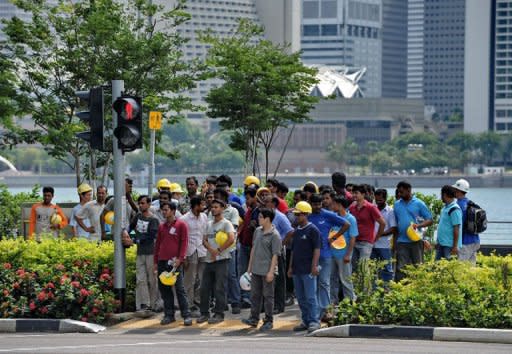Foreign workers in Singapore 'bear the brunt'
After shattering his left heel bone when he fell off a ladder, Chinese national Ah Ping's already difficult life as a labourer in Singapore took a sharp turn for the worse. His Singaporean contractor boss refused to file an injury compensation claim with the manpower ministry, fearing it would sully the company's record. When Ah Ping applied for it himself after nine days in hospital, things turned ugly. "He came up to me while I was resting and asked me why I filed the claim," said the 23-year-old from Shandong province, in eastern China, his youthful face creased in a frown. "He got angry and slapped me in the face, then he raised his fists and punched me," said Ah Ping, who cannot give his full name because he is assisting police with investigations. Fleeing the dank, mosquito-ridden warehouse he says his boss forced him to stay in, Ah Ping went to aid group Humanitarian Organisation for Migration Economics (HOME) seeking refuge in their shelter for exploited foreign workers. Social workers in Singapore are reporting a rise in the number of foreign workers such as Ah Ping who approach them for help with cases ranging from wage disputes to assault. Maligned by some Singaporeans for supposedly stealing jobs and causing overcrowding, foreigners holding work permits numbered more than 870,000 at the end of 2010 out of Singapore's total population of 5.1 million. They often do the dirty, difficult and dangerous jobs that Singaporeans shun, toiling as maids, construction hands, street sweepers, garbage collectors, cooks and dishwashers as well as lower-end factory workers. Most come from China, South Asia and Southeast Asia. "We see an average of about 120 to 150 workers a month... four years ago it was less, maybe about 100," said Jolovan Wham, executive director of HOME. "The cases that we see are mostly about labour exploitation," he told AFP in his office as more than 10 workers waited their turn to consult him and his colleagues about their woes. Even though the manpower ministry reported a fall in foreign worker complaints from a three-year high of 3,774 in 2009 to 3,200 last year, Wham said the figure was "not reliable" as it focused on only salary-related issues. Wham said the liberalisation of Singapore's immigration policies in recent years to bring in more workers to power the labour-starved economy contributed to the growing number of abuse cases. "The government sees foreign workers as economic digits, here to help grow the economy, so they look at them as commodities," he said. The government has slowed down the intake of foreigners since the 2009 recession but says the economy cannot function without a steady stream of blue-collar workers. The presence of so many foreign workers in a densely populated city-state has become a hot issue in Singapore and the debate reached a crescendo in the campaign for last month's general elections, raising fears of more abuse. Migrant worker rights advocacy group Transient Workers Count Too (TWC2) reported an increase in the number of foreign workers seeking help to 2,178 last year, from 2,087 in 2009, and fears the number may rise again. TWC2 executive director Vincent Wijeysingha, who lost as an opposition candidate in the May election, said the manner in which immigration was discussed during the campaign could hurt foreign workers even more. "Unfortunately what the elections did, and we politicians must shoulder our share of responsibility for it, is that a xenophobic approach to foreigners could become widespread," Wijeysingha told AFP. "In other countries, when a politician says something that could be viewed as xenophobic, a spike in hate crime sometimes results. It may not be entirely different in Singapore." Before the elections, xenophobic sentiment had surfaced in scattered incidents, including one in 2008 when residents of an affluent suburb protested against the building of a foreign worker dormitory in their estate. The residents petitioned the government to drop the plan, saying the dormitory -- separated from the estate by a road -- would "create security and social problems and spoil the ambiance of the estate". Authorities still approved the project but advised the dormitory operator to consider chartering buses to ferry workers to popular destinations in order to prevent them from congregating within the estate. Ah Ping, the Chinese worker who accused his boss of beating him up over an injury compensation claim, now worries about how he is going to repay a 470,000 yuan ($72,400) bank loan he took out to pay a middleman to get a job in Singapore. An only child, he also needs to support his parents, whom he has not seen since he came to Singapore two-and-a-half years ago. "Sometimes I listen to the old songs my mum used to sing on the radio and...," Ah Ping mused, his voice trailing off as he looked away into the distance.



